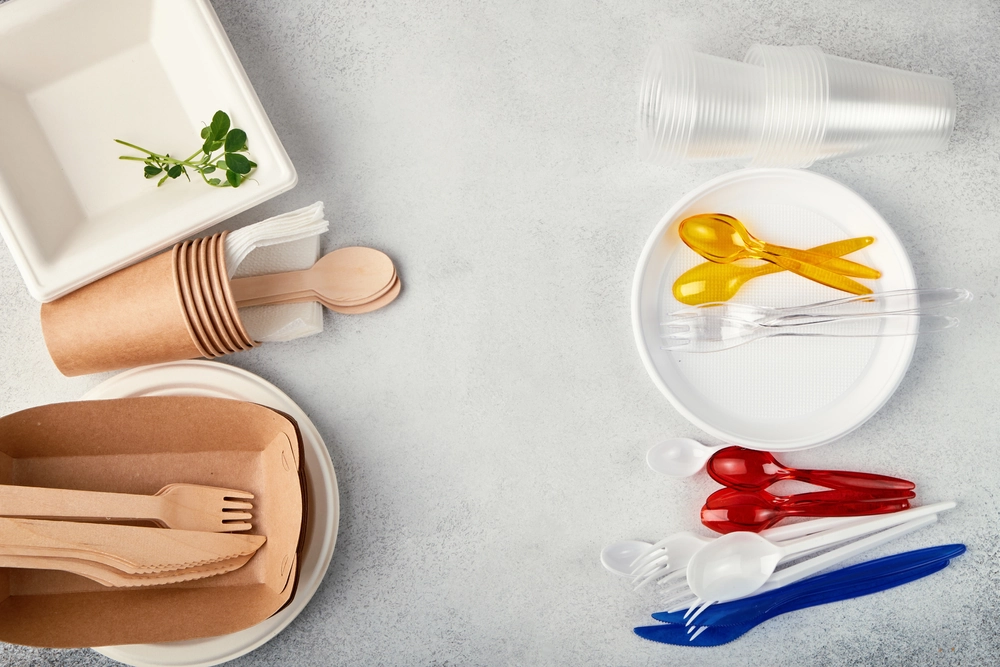
Retailers: Are you prepared for the ban on single-use plastics?


Under new Environmental Protection regulations, the UK government has announced its plans to ban single-use plastic. Our article looks at what items will be banned and how retailers can prepare.
When it comes to its environmental agenda, the UK government has seemingly accelerated change.
Not only have we seen new civil sanctions introduced for environmental offences, but the government has now placed Environmental Protection regulations, banning single-use plastic, before Parliament.
The government intends for the ban to come into effect on 1 October 2023.
Why are these regulations important for retailers?
These regulations are important for retailers because they will ban the use of single-use plastic items including:
- Cutlery
- Plates
- Bowls
- Trays
- Balloon sticks
- Certain types of polystyrene cups and food containers will also be banned.
Breach of the regulations could also lead to civil sanctions.
How is single-use defined?
Single-use means the item is meant to be used only once for its original purpose.
Having already banned single-use straws, stirrers, and cotton buds and implemented a charge for plastic carrier bags, this legislation aims to further reduce reliance on single-use plastic and in doing so help the environment.
What is the scope of the ban?
The ban will be wide-reaching and will apply to all items sold online and over-the counter whether the stock is new or existing stock.
It will also encompass all types of single-use plastic, including biodegradable, compostable and recycled plastic and applies whether the item is wholly plastic or just has it included in the coating or lining.
Is it an absolute ban?
No, the legislation will only apply to food and drinks containers, or packaging of items intended for immediate consumption without further preparation.
It does not apply to items such as meat packaging or pre-packaged shelf ready items.
What items does it apply to?
Cutlery - You must not supply any single-use plastic cutlery or balloon sticks.
Plastic plates, trays, and bowls - You must not supply single-use plastic plates, trays and bowls unless you are supplying them to another business, or the items are packaging (pre-filled or filled at the point of sale).
Examples of this could include:
- A pre-filled salad bowl or ready meal packaged in a tray
- A plate filled at the counter of a takeaway
- A tray used to deliver food
Polystyrene - You must not supply ready-to-consume food and drink in polystyrene containers. This includes in polystyrene cups. There is an exemption where the food/drink needs further preparation for example, adding water, microwaving, or toasting.
Only polystyrene that has been through a foaming process is in the scope of this ban. For more details on this see the government guidance.
How will the ban be enforced?
Local authorities will carry out inspections to make sure the rules are being followed. Inspectors can visit a shop or store, make test purchases, speak to staff or ask to see relevant records.
What sanctions can be imposed?
Local authorities will have the power to impose civil sanctions (clearly flavour of the month!), which are described in the regulations as being a fixed monetary penalty of £200 or issue a compliance notice known as a 'stop' notice. They may even commence a prosecution in the Magistrates Court.
Inspectors from the local authority can order your business to cover the cost of the investigation. Complaints about breaches of the law can also be made to Trading Standards.
Where a local authority intends to impose a fixed monetary penalty, it must first serve notice on a business informing them of this intention. The business can then lodge an appeal within 28 days if you think something is wrong. The letter with the fine will tell you what to do.
The local authority has the power to prosecute offenders in the Magistrates Court if it considers the offending behaviour is sufficiently serious to warrant this action. A failure to pay a fixed monetary penalty could also lead to prosecution.
If your business can show that you did everything you reasonably could to avoid breaking any rules, you could rely on this as a defence – the so called, "due diligence" defence.
How should I prepare?
- Use up existing stock before 1 October 2023.
- Find re-usable alternatives to single-use items.
- Encourage customers to bring their own reusable containers and cutlery.
- Offer a discount or incentive to people who bring their own reusable containers.
- Take steps now to make use of different materials for single-use items (for example, bamboo or cardboard). Our Regulatory team can put you in contact with independent consultants to assist you in identifying alternatives.
If you would like support on dealing with the challenges posed by the above, please get in touch with Tim Williamson or Nathan Peacey.







![Goodwill Hunting: MVL Properties v The Leadmill [2025] featured image](https://www.footanstey.com/wp-content/uploads/2025/03/beer-brewery-2024.jpg)



